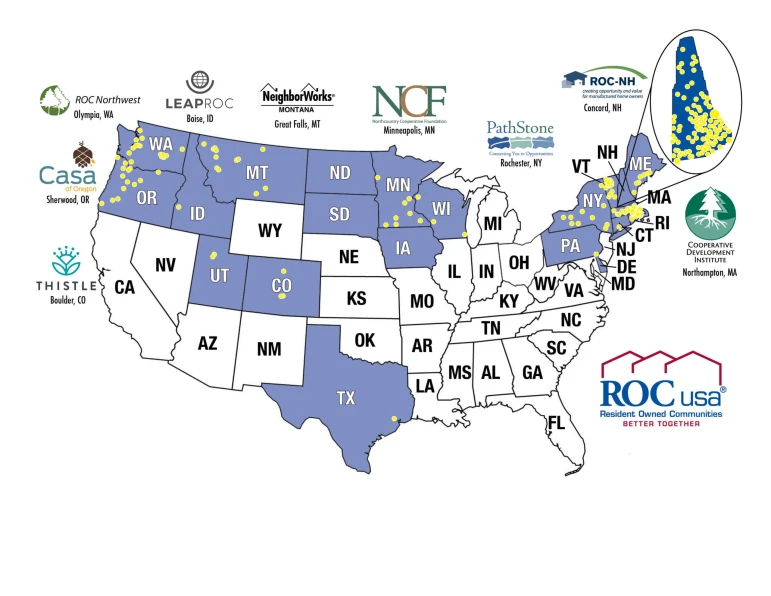We founded ROC USA® to make resident ownership a viable option for homeowners, and when communities choose ownership, to work together to make it successful.
The choice homeowners are making is clear: In 2019, ROC USA® Network helped 25 groups become Resident Owned Communities (ROCs), a historic number of new ROCs in a single year, and a 50% increase over the last 4-year average of 16.
Those new ROCs are in 13 states from Washington to Maine and exceed our previous record of 9 different states in 2018. The 2,349 home-sites preserved is a 900-home increase over 2016. 
In 2019, ROC USA® Capital provided $48.5 million of acquisition and improvement financing to 16 ROCs – both records.
At this pace, ROC USA Network will exceed its 10-year (June 2028) goal of serving 30,000 Member-Owners.
This dedication of ROC Member-Owners and leaders, along with the affiliate and national teams, comes down to a basic belief that whoever owns the land controls the future.
The data supports our belief that economic security and control over future costs through resident ownership is working. The independent site-fee study continues to document that ROC fees are below market after 5 years of ownership. Last year’s report documented an average savings of $32.70 per month in ROCs when looked at with comparable privately-held communities.
Data from ROC USA Capital’s portfolio supports that independent finding. It shows ROCs raise site-fees less than 1% per year compared to the industry average of 3.9%. [2019, DataComp]
That impact is real for co-ops like Marilla Country Village in Alden, N.Y. where Dennis Jakubowski, Board President, said his 154-site neighborhood is more than 50 percent seniors on fixed incomes. Shortly after Marilla became a co-op, he said, “Residents were getting sick of lot rent going up $25 a month with no improvements.”
Recently, Jakubowski said, “We’ve raised our site-fees just $10 since we purchased the community in 2011, and in that time, the co-op has invested more than $250,000 in improvements, including new roads that look great. Owning our community is the best thing we have ever done.”
In reflecting on these outcomes, I say congratulations and thank you to all of the Member-Owners and community leaders who produced these results! You’re taking responsibility for yourselves and your neighborhood and delivering affordable and secure homeownership in your market area. Well done!
I am also grateful to the teams in each of our Network affiliates and in our national office. Your dedication to these communities and homeowners and our mission is commendable. Thank you.
Only 10 years ago, we still had to prove the concept.
Do homeowners in states outside New Hampshire want co-op ownership? Can we organize a Network of regional nonprofits to serve as front-line niche experts in co-op development? Can we raise and manage the capital needed by these communities?
Would this work?
Look at us now! We welcomed 143 new co-op communities in 17 states in the last decade. Prior to our founding in May 2008, this was only proven in New Hampshire, where co-ops have been buying communities since 1984.
The decade finished with questions of sustainability and movement building. Are ROCs sustainable? Is ROC USA sustainable? Are affiliates sustainable in their ROC lines of business? Are ROC leaders capable of spawning a movement? Can leaders step up locally, regionally and nationally to lead?
I can report strong progress on both sets of questions.
ROCs have proven themselves are sustainable – still none in this network has resold their community although that could happen as these are controlled by the Member-Owners locally. Our goal has always been local control and long-term preservation of affordable homeownership, like some others in the nonprofit sector. And, while we have had co-ops buy-out nonprofit and public housing authority owners, none have yet gone the other way.
ROC USA achieved operating self-sufficiency the last two years, even with substantial investments in an expanded operations team in 2019. This is really key because you cannot scale anything that is not sustainable, and we’re focused on making resident ownership viable and successful in all 49 states eventually. (Which is the only state with no manufactured home communities? See the answer at the end of this blog.).
A former colleague put it best, “First affix your oxygen mask before trying to assist others.”
Now, seeking resources to make mission and program investments, that’s exciting! We raise grants for equity in ROC USA Capital and we have some program investments.
One of our key investments now is in ROC USA Network affiliates where some have secured self-sufficiency some years but not consistently. We need regional teams that are well-supported if we are to expect consistently strong service to ROCs and local development systems. Network sustainability is a major part of our current Strategic Plan.
On the issue of movement building, this, too, is one goal in progress. The ROC Association Directors – those co-op leaders elected to the national ROC USA Board by local ROC Boards – are proving that local leaders can step up nationally and lead. Natividad, Kim and Lorie have each had national speaking engagements and motivated change within their regions. We are sorry to see Natividad reach her term limit today but are excited that the two national committees are about to get under way, and she’s first on the list for Policy & Advocacy. We are happy to welcome Marjory from Minnesota as the new Midwest Region representative for this next push!
That’s a wrap on 2019, although there’s so much more I could say. Onward together in 2020, beginning tomorrow!
Answer: Hawaii
